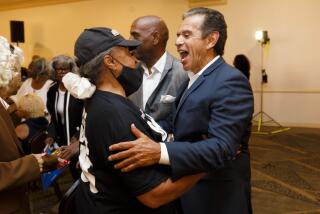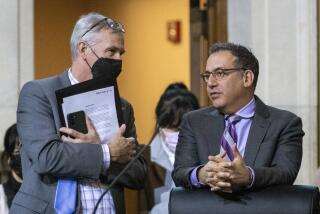Leveraging layoffs to save L.A.
Archimedes, who knew about such things, said that with a long enough lever and a solid place to stand, he could move the world.
Watching Mayor Antonio Villaraigosa trekking around the city this week, making the case for dramatic action to correct the structural deficit that threatens to push Los Angeles into insolvency, was a bit like watching a man intent on moving the civic world as we’ve known it. And it was clear he believes he’s found his lever in the threat of layoffs: 1,000 in this budget cycle and as many as 2,000 next year.
He’s right about his leverage.
He’d be in an even stronger place to use it if he would articulate a coherent vision of what a just and prosperous Los Angeles would look like. He needs, in other words, a place to stand while he uses the lever.
Is this only to be a city that provides world-class police and fire protection, or must it do other things for its people? If we can consider privatizing parking, the zoo and the convention center -- a kind of reverse spin on lemon socialism -- what about the really big-ticket assets, such as the airport, harbor or Department of Water and Power? (I happen to think the city should hold on to the proprietary departments for a host of reasons, but there’s a case to be made that adequate state and federal regulations now ensure the public’s interest in such operations and that some form of public/private partnership would make them more profitable.)
The point is that it would be easier to judge the mayor’s case for layoffs if we -- and the City Council -- could measure their impact on the city he envisions.
That said, it also is true that the mayor already has taken absolutely crucial steps. First, by focusing on the structural nature of the city’s budget shortfalls, he’s helped make it clear that -- all the sniping at bloated bureaucracy to the contrary -- the city performs few frivolous functions, and those that are of little importance to people are of only marginal cost. Second, by creating a new municipal jobs czar with responsibility for encouraging private-sector growth, the mayor has acknowledged that businesses, not government, need to lead the way out of this jobless economic rebound.
As the mayor told the Chamber of Commerce this week, he understands “that if government is generating the jobs in our economy, we are all in a bad situation. If you look at other countries, it is the private sector that is the generator of jobs, the generator of wealth.” We can’t, in other words, continue down an economic path that, in the not-very-distant future, will turn us into America’s municipal equivalent of Greece.
Finally, in his meetings with the council, the chamber and the media, the mayor made it plain that organized labor needs to step up and help resolve this crisis.
“I see no scenario where the city survives without layoffs or some concessions by the city unions,” Villaraigosa told business leaders this week. In that and other conversations, he said he would ask the unions to take pay cuts of between 5% and 10% in the coming year. “We can minimize layoffs if employees agree to a cut,” he said. “A 5% cut would bring in $150 million. That’s 1,500 jobs.”
That’s a powerful incentive. Solidarity is the essence of the labor movement, and if the civic unions can keep thousands of colleagues working by taking a single-digit pay reduction, it’s hard to grasp the counterargument.
Even so, it’s important to keep in mind that mandatory furloughs already have reduced the annual income of most of the city’s employees who aren’t police officers or fire-fighters by at least 5%. That makes it critical, if across-the-board pay reductions are adopted, that the police and fire unions step up and take an equitable share in the sacrifice. That’s doubly true, given the mayor’s firm commitment to maintaining both the police and fire staffs at their current levels.
Labor is unlikely ever to have a better friend in the mayor’s office than ex-union organizer Antonio Villaraigosa. Layoffs are a political lever to which he has reluctantly put his hand. If the unions -- particularly police and fire -- will do the right thing, he can let go. That would be in everybody’s interest.
More to Read
Sign up for Essential California
The most important California stories and recommendations in your inbox every morning.
You may occasionally receive promotional content from the Los Angeles Times.










